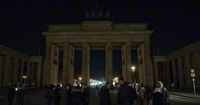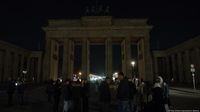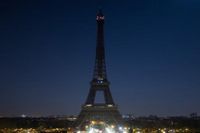On March 22, 2025, cities across the globe participated in the annual Earth Hour event, a worldwide initiative organized by the World Wide Fund for Nature (WWF). The campaign encourages individuals, businesses, and governments to turn off non-essential lights for one hour to raise awareness about climate change and promote environmental sustainability.
This year marked the 19th edition of Earth Hour, which first began in Australia in 2007. It has since grown to involve over 180 countries, urging people to engage in energy-saving actions. As part of the event, notable landmarks around the world turned off their lights for one hour, symbolizing a commitment to combating climate change and protecting our planet.
In London, iconic sites like the Big Ben and Tower Bridge were dimmed as a show of solidarity during the event. Reports shared images taken during Earth Hour, revealing a striking contrast of the city: one picture shows Big Ben illuminated before the event, with another capturing the darkened clock tower during the hour of darkness. The Piccadilly Circus electronic billboard also switched off its lights, enhancing the city’s atmosphere of reflection.
Paris joined in with its own iconic landmark—the Eiffel Tower—going dark for an hour. This act served as a reminder of the urgent need to address environmental issues, especially the escalating climate crisis. The WWF has highlighted that Earth Hour aims this year to draw attention to the growing loss of natural ecosystems and climate-related challenges above all else.
Spanning continents, the festival of dimming lights began in New Zealand, where the Sky Tower observation and telecommunications tower, as well as the Auckland Harbour Bridge, heralded the event. When it struck 8:30 p.m. local time, the lights turned off in cities across Asia and Europe aligning with a collective decision to demonstrate their commitment to environmental sustainability. Major buildings, including the Sydney Opera House in Australia and the Brandenburg Gate in Berlin, were also plunged into darkness.
In the words of Kirsten Schuijt, Director General of WWF International, 7The stakes have never been higher. Last year was the warmest since records began. We have seen historic wildfires, storms, and droughts. Our world is at risk and we are rapidly approaching dangerous climate tipping points from which key ecosystems may never recover. Earth Hour is a stark reminder that we must act urgently while we still can.8 This statement underlined the significance of Earth Hour in the context of our current climatic challenges.
In addition to international landmarks, numerous municipalities in Germany joined the campaign, with approximately 500 locations participating. The lights were extinguished across multiple sites, including Cologne Cathedral and Neuschwanstein Castle, as community members sang songs and encouraged one another to take part in the movement.
The initiative is not solely focused on its visible impact but also on fostering active engagement in environmental practices. Individuals were encouraged to take part in Earth Hour by dedicating time to actions beneficial for the planet, such as enjoying outdoor activities, eating sustainably, or even learning through nature documentaries. By collecting these individual hours online, contest organizers hope to inspire a global movement advocating for environmental protection.
Brussels' public transport operator, STIB/MIVB, dimmed lights in 20 of its metro and pre-metro stations, saving approximately 470 kilowatt-hours, an amount equivalent to the monthly electricity consumption of around 1.6 households. The company noted that while operational efficiency is critical for reducing ecological footprints, the significance of community engagement in awareness-raising campaigns is essential for their success.
New York City's skyline appeared darker as the Empire State Building turned off its lights from 8:30-9:30 p.m. This act was part of Earth Hour and reinforced the message that individual actions can collectively lead to significant change. An official statement from the WWF emphasizes that 7Earth Hour is a powerful reminder of the urgency to act while we still can. It is not just about switching off lights; it's about switching on a global movement for change. By engaging individuals, communities, and businesses, we can create a collective force that drives real impact and inspires hope for a sustainable future.8
Throughout the evening's events, various figures expressed their support for Earth Hour. The campaign resonates with diverse audiences throughout the world, from local communities to global cities, each reflecting a shared desire for a more sustainable future in the face of climate challenges.
As we reflect on the impact of Earth Hour in 2025, it becomes clear that the initiative encourages global citizens to recognize their individual roles in addressing environmental concerns. The event is much more than just a brief moment of darkness; it’s a powerful call to action for humanity's shared responsibility in nurturing and protecting our world.





